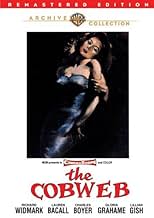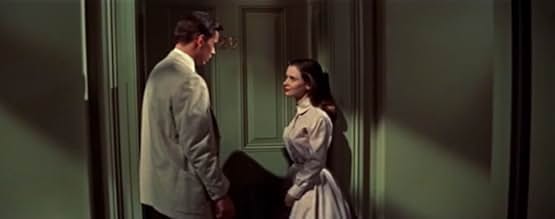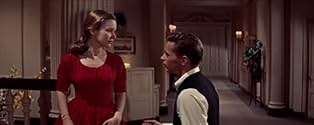Aggiungi una trama nella tua linguaAt a private psychiatric clinic, the daily dramas and interactions between the doctors, nurses, administrators, benefactors and patients are accentuated by the personal and family crises of ... Leggi tuttoAt a private psychiatric clinic, the daily dramas and interactions between the doctors, nurses, administrators, benefactors and patients are accentuated by the personal and family crises of these individuals.At a private psychiatric clinic, the daily dramas and interactions between the doctors, nurses, administrators, benefactors and patients are accentuated by the personal and family crises of these individuals.
- Regia
- Sceneggiatura
- Star
Recensioni in evidenza
The main difference between patients and staff is that the patients seem more self aware, often knowing just what their problems are, in contrast to the staff who flounder in self ignorance while totally unaware of their own internal issues. Overall the film lacks much depth, maybe the depth was lost in the editing process, so that we are left with...well...mostly just drapes (at least four different sets of drapes by my count, if you include the originals that are to be replaced). Maybe the writers of this story had a drapery fetish? Strange, but you never know!
Lillian Gish and Gloria Grahame steal the movie and their performances are worth your viewing time. The whole movie is a guilty pleasure, as neither inmates nor staff seem to be in charge of this asylum. Its fun to watch as the wheels come off and the "Institute for Neurosis" descends into 1950's campy chaos.
People fret about the drapes--well really they're only the trigger for the clash. I have the strong feeling that by leaving Chicago to settle in this back-water, McIver has made a mountain of trouble for himself. His wife Karen (splendid performance by Gloria Grahame) is experiencing severe boredom and frustration; she's a sensual romantic woman who is being ignored by her husband, who is trying to find romance with Meg Rinehart (a cool Lauren Bacall). The romantic disappointments of the main characters make this film work.
What's interesting is that there is no antagonist; like "Howards End" or Eastwood's "Unforgiven", all the characters do bad things for understandable reasons and thus construct the cobweb. This compares favorably with other nuthouse movies, especially ones about the group therapy system--"Cuckoo's Nest" (based on Ken Kesey's novel of 1950, 5 years before "Cobweb") and "The Caretakers" with Joan Crawford as the inflexible head nurse. Those films tend to focus on patients having hysterics and running riot. They don't indict the system but one despotic individual within it (a head nurse); Kesey's narrator claims that she represents a larger controlling force but even then shows that other wards in the hospital are not the same. However, "Cobweb" takes a more subtle nobody's-fault approach that ultimately has wider, darker implications. It implies that these pitfalls are endemic to the system because they are part of human nature, which is a more sinister idea (especially for the 50s) than being able to blame a convenient mini-Hitler. Therefore, it works more convincingly as a microcosm of a society that thinks it's healthy. It's also more salutary and hopeful than those films because it proceeds from this clear-eyed cautionary assessment.
In the true sense of "melodrama," it underlines apparently innocuous early scenes with heavy foreboding music by Leonard Rosenman. It's also astonishing to watch Lillian Gish play a b----. And she does a great job.
How it ever got the green light from the studio is mystery number one, that Vincente Minnelli said okay to directing it is the second although that would explain why so many great actors allowed themselves to be involved.
Everybody gives overheated performances except Lauren Bacall who keeps a low-key dignity amongst the melodrama and Susan Strasberg offers a restrained quiet portrait of a shut-in who is making her first tentative steps towards reemerging into the world.
The rest of the players aim for the rafters to varying degrees from Richard Widmark's impassioned but distracted doctor who is merely agitated then there is Lillian Gish who chews a bit of scenery as a bitter spinster as well as many other respected actors who show little restraint.
The real standout though is Gloria Grahame as Richard's hot mess of a wife, she seems to realize how silly the whole thing is and pitches her performance to that tempo, she's jittery, flouncy and fun plus she looks great.
Laughable take on mental health but good for one fun viewing as a camp catastrophe.
Lo sapevi?
- QuizMarks the return of Lillian Gish to MGM after a 22-year absence. The Cobweb was Lauren Bacall first film for MGM.
- BlooperWhen Karen (Gloria Grahame) storms into her bedroom and kicks off her shoes, she apparently launches the first one over the walls of the set, as it shoots straight up toward the supposedly low ceiling but never comes down.
- Citazioni
Steven Holte: Artists are better off dead.
Karen McIver: Why?
Steven Holte: People pay more attention to them when they're dead. That's what's so troublesome.
Karen McIver: Is that what you are, a painter?
Steven Holte: They said Van Gogh was crazy because he killed himself. He couldn't sell a painting while he was alive, and now they're worth thirty million dollars. They weren't that bad then and they're not that good now, so who's crazy?
- ConnessioniFeatured in Senza un attimo di tregua (1967)
I più visti
Dettagli
- Data di uscita
- Paese di origine
- Lingua
- Celebre anche come
- The Cobweb
- Luoghi delle riprese
- St. Louis Street, Lot 3, Metro-Goldwyn-Mayer Studios - 10202 W. Washington Blvd., Culver City, California, Stati Uniti(McIver's neighborhood, demolished in 1972)
- Azienda produttrice
- Vedi altri crediti dell’azienda su IMDbPro
Botteghino
- Budget
- 1.976.000 USD (previsto)
- Tempo di esecuzione
- 2h 14min(134 min)
- Proporzioni
- 2.55 : 1





































